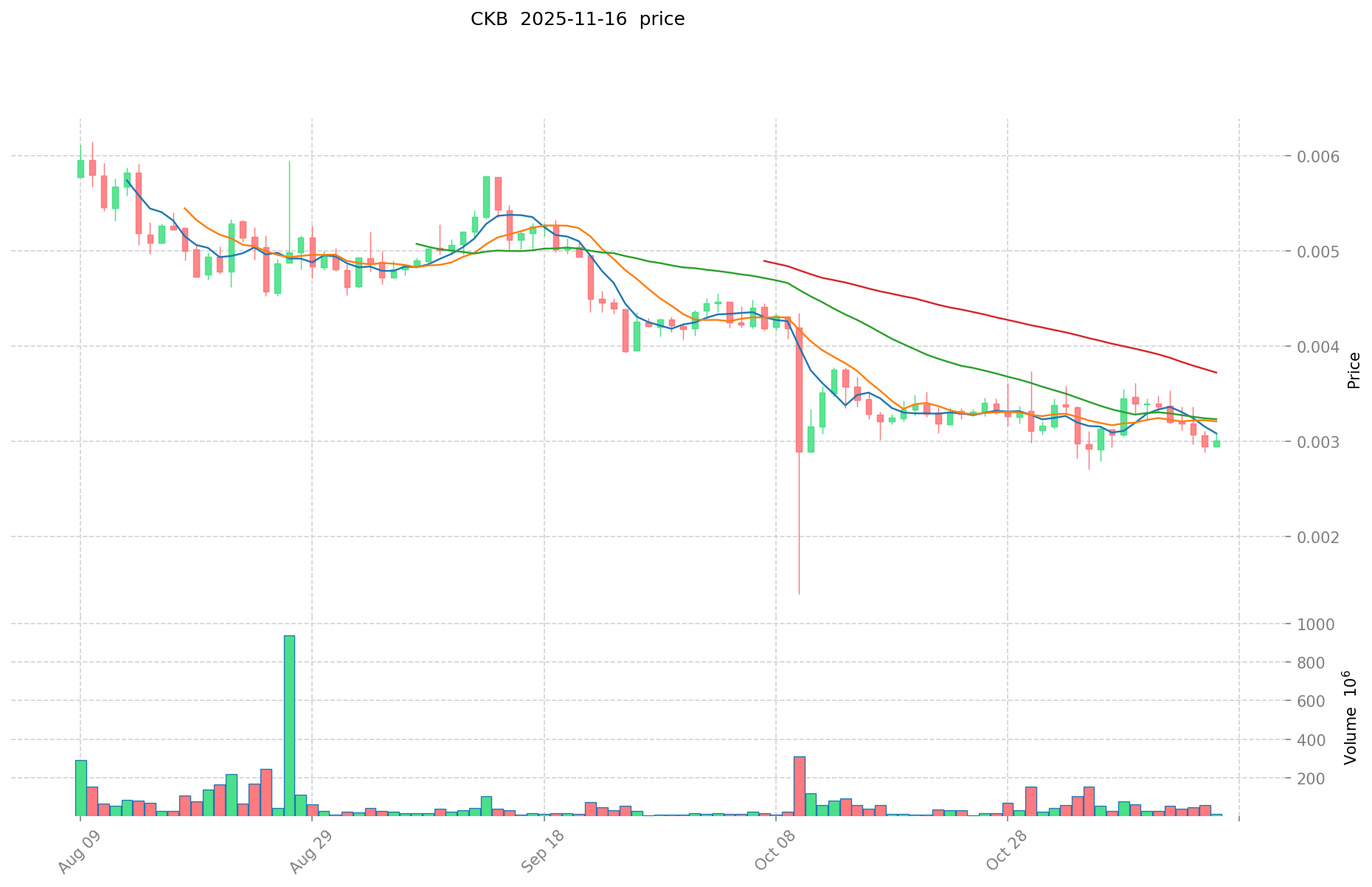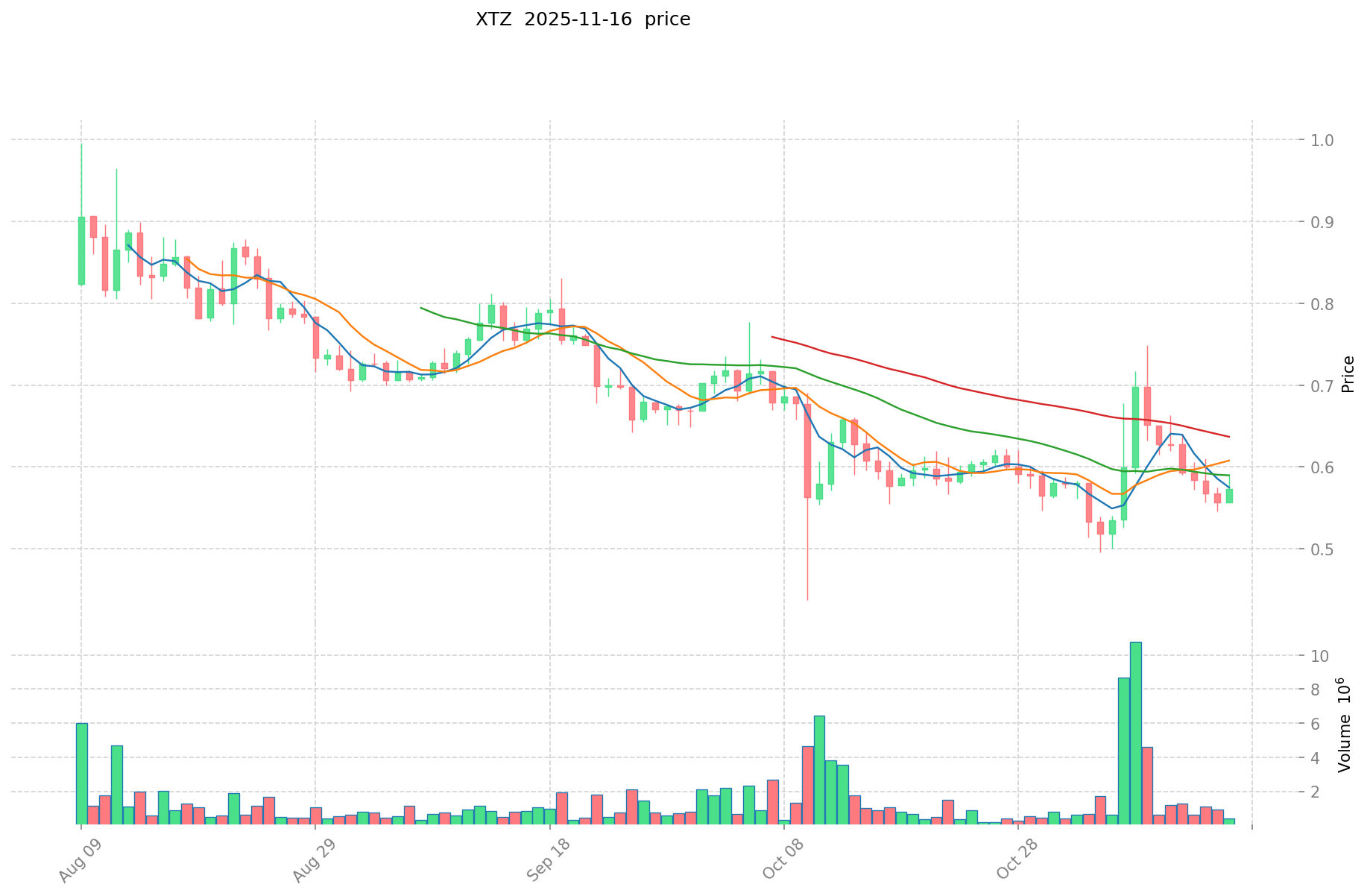CKB vs XTZ: Comparing Two Innovative Blockchain Platforms for Smart Contract Functionality
Introduction: Investment Comparison between CKB and XTZ
In the cryptocurrency market, the comparison between Nervos (CKB) vs Tezos (XTZ) has always been a topic that investors cannot avoid. The two not only have significant differences in market cap ranking, application scenarios, and price performance, but also represent different positions in crypto assets.
Nervos (CKB): Since its launch, it has gained market recognition for its open-source public chain ecosystem and layered protocols.
Tezos (XTZ): Since its inception in 2017, it has been hailed as a self-evolving blockchain platform, and is one of the cryptocurrencies with high global trading volume and market capitalization.
This article will comprehensively analyze the investment value comparison between CKB vs XTZ, focusing on historical price trends, supply mechanisms, institutional adoption, technical ecosystems, and future predictions, and attempt to answer the question that investors care most about:
"Which is the better buy right now?"
I. Price History Comparison and Current Market Status
CKB and XTZ Historical Price Trends
- 2021: CKB reached its all-time high of $0.04370633 on April 1, 2021.
- 2021: XTZ hit its all-time high of $9.12 on October 4, 2021.
- Comparative analysis: During the market cycle, CKB dropped from its high of $0.04370633 to a low of $0.00197892, while XTZ fell from $9.12 to a low of $0.350476.
Current Market Situation (2025-11-16)
- CKB current price: $0.00298
- XTZ current price: $0.5676
- 24-hour trading volume: CKB $77,702.63 vs XTZ $242,089.32
- Market Sentiment Index (Fear & Greed Index): 10 (Extreme Fear)
Click to view real-time prices:
- View CKB current price Market Price
- View XTZ current price Market Price
<>


II. Core Factors Affecting CKB vs XTZ Investment Value
Supply Mechanism Comparison (Tokenomics)
- CKB: Inflationary model with an initial base issuance that decreases over time through halving events; features both base and secondary issuance mechanisms
- XTZ: Inflationary model with approximately 5% annual inflation through its baking (staking) rewards
- 📌 Historical pattern: CKB's halving mechanism may create similar supply shocks to Bitcoin, potentially driving price cycles, while XTZ maintains a more stable and predictable inflation rate.
Institutional Adoption and Market Applications
- Institutional holdings: Limited information available for both assets regarding significant institutional adoption
- Enterprise adoption: CKB's Nervos Network focuses on interoperability solutions for enterprises, while Tezos has gained traction in the digital art and NFT sectors
- National policies: Both projects operate within regulatory uncertainty in most jurisdictions, with neither having clear regulatory advantages
Technology Development and Ecosystem Building
- CKB technology upgrades: Focus on interoperability solutions like Force Bridge and the Axon framework for enhanced scalability
- XTZ technology development: Regular protocol upgrades through on-chain governance and focus on formal verification for security
- Ecosystem comparison: Tezos has a more established NFT ecosystem and corporate partnerships, while CKB is building cross-chain infrastructure with DeFi applications still developing
Macroeconomic and Market Cycles
- Performance in inflationary environments: Limited historical data for both tokens during significant inflation periods
- Macroeconomic monetary policy: Both assets show correlation with broader crypto market movements in response to monetary policies
- Geopolitical factors: CKB has stronger connections to Asian markets, particularly China, while XTZ has more global distribution
III. 2025-2030 Price Prediction: CKB vs XTZ
Short-term Prediction (2025)
- CKB: Conservative $0.00231 - $0.003 | Optimistic $0.003 - $0.00351
- XTZ: Conservative $0.438053 - $0.5689 | Optimistic $0.5689 - $0.603034
Mid-term Prediction (2027)
- CKB may enter a growth phase, with expected price range of $0.002634597 - $0.004712589
- XTZ may enter a bullish market, with expected price range of $0.3819918873 - $1.0162425681
- Key drivers: Institutional capital inflow, ETF, ecosystem development
Long-term Prediction (2030)
- CKB: Base scenario $0.005001222552637 | Optimistic scenario $0.005201271454743
- XTZ: Base scenario $1.07797101560886 | Optimistic scenario $1.261226088262366
Disclaimer: This analysis is based on historical data and market projections. Cryptocurrency markets are highly volatile and unpredictable. These predictions should not be considered as financial advice. Always conduct your own research before making investment decisions.
CKB:
| 年份 | 预测最高价 | 预测平均价格 | 预测最低价 | 涨跌幅 |
|---|---|---|---|---|
| 2025 | 0.00351 | 0.003 | 0.00231 | 0 |
| 2026 | 0.0041664 | 0.003255 | 0.0022134 | 9 |
| 2027 | 0.004712589 | 0.0037107 | 0.002634597 | 24 |
| 2028 | 0.004759158285 | 0.0042116445 | 0.0033693156 | 41 |
| 2029 | 0.005517043712775 | 0.0044854013925 | 0.004171423295025 | 50 |
| 2030 | 0.005201271454743 | 0.005001222552637 | 0.00385094136553 | 67 |
XTZ:
| 年份 | 预测最高价 | 预测平均价格 | 预测最低价 | 涨跌幅 |
|---|---|---|---|---|
| 2025 | 0.603034 | 0.5689 | 0.438053 | 0 |
| 2026 | 0.85551182 | 0.585967 | 0.3515802 | 3 |
| 2027 | 1.0162425681 | 0.72073941 | 0.3819918873 | 26 |
| 2028 | 0.990079727517 | 0.86849098905 | 0.6687380615685 | 53 |
| 2029 | 1.22665667293422 | 0.9292853582835 | 0.70625687229546 | 63 |
| 2030 | 1.261226088262366 | 1.07797101560886 | 0.808478261706645 | 89 |
IV. Investment Strategy Comparison: CKB vs XTZ
Long-term vs Short-term Investment Strategies
- CKB: Suitable for investors focused on interoperability solutions and ecosystem potential
- XTZ: Suitable for investors seeking established NFT markets and corporate partnerships
Risk Management and Asset Allocation
- Conservative investors: CKB: 30% vs XTZ: 70%
- Aggressive investors: CKB: 60% vs XTZ: 40%
- Hedging tools: Stablecoin allocation, options, cross-currency portfolios
V. Potential Risk Comparison
Market Risks
- CKB: Higher volatility due to lower market cap and trading volume
- XTZ: Exposure to broader crypto market trends and NFT sector fluctuations
Technical Risks
- CKB: Scalability challenges, network stability during early development stages
- XTZ: Governance risks associated with on-chain upgrade processes
Regulatory Risks
- Global regulatory policies may impact both assets differently, with CKB potentially facing more scrutiny due to its connections to Asian markets
VI. Conclusion: Which Is the Better Buy?
📌 Investment Value Summary:
- CKB advantages: Strong focus on interoperability, potential for growth in cross-chain solutions
- XTZ advantages: Established NFT ecosystem, regular protocol upgrades through on-chain governance
✅ Investment Advice:
- Novice investors: Consider a balanced approach with a higher allocation to XTZ due to its more established market presence
- Experienced investors: Explore opportunities in both assets, with a potential higher risk-reward ratio in CKB
- Institutional investors: Evaluate both assets based on specific use cases and integration potential with existing systems
⚠️ Risk Warning: The cryptocurrency market is highly volatile, and this article does not constitute investment advice. None
VII. FAQ
Q1: What are the main differences between CKB and XTZ in terms of their technological focus? A: CKB focuses on interoperability solutions and cross-chain infrastructure, while XTZ emphasizes on-chain governance and formal verification for security. CKB is building the Nervos Network with a layered architecture, while Tezos has established itself in the NFT and digital art sectors.
Q2: How do the supply mechanisms of CKB and XTZ differ? A: CKB has an inflationary model with a halving mechanism similar to Bitcoin, featuring both base and secondary issuance. XTZ, on the other hand, has a more stable inflationary model with approximately 5% annual inflation through its baking (staking) rewards.
Q3: Which asset has shown better price performance historically? A: XTZ has historically reached a higher all-time high of $9.12 compared to CKB's $0.04370633. However, both assets have experienced significant drops from their peaks, with CKB showing higher volatility due to its lower market cap.
Q4: How do CKB and XTZ compare in terms of institutional adoption? A: Both assets have limited information available regarding significant institutional adoption. However, XTZ has gained more traction in corporate partnerships, particularly in the NFT sector, while CKB focuses on enterprise interoperability solutions.
Q5: What are the main risk factors to consider when investing in CKB and XTZ? A: For CKB, key risks include higher volatility, scalability challenges, and potential regulatory scrutiny due to Asian market connections. XTZ faces risks associated with on-chain governance processes and exposure to NFT market fluctuations. Both are subject to general cryptocurrency market volatility and regulatory uncertainties.
Q6: How do the long-term price predictions for CKB and XTZ compare? A: By 2030, the base scenario predicts CKB at $0.005001222552637 and XTZ at $1.07797101560886. The optimistic scenarios are $0.005201271454743 for CKB and $1.261226088262366 for XTZ. These predictions suggest potentially higher percentage gains for CKB, but with higher associated risks.
Q7: Which asset might be more suitable for different types of investors? A: Novice investors might consider a higher allocation to XTZ due to its more established market presence. Experienced investors could explore opportunities in both, with CKB potentially offering a higher risk-reward ratio. Institutional investors should evaluate both based on specific use cases and integration potential with existing systems.
Share
Content